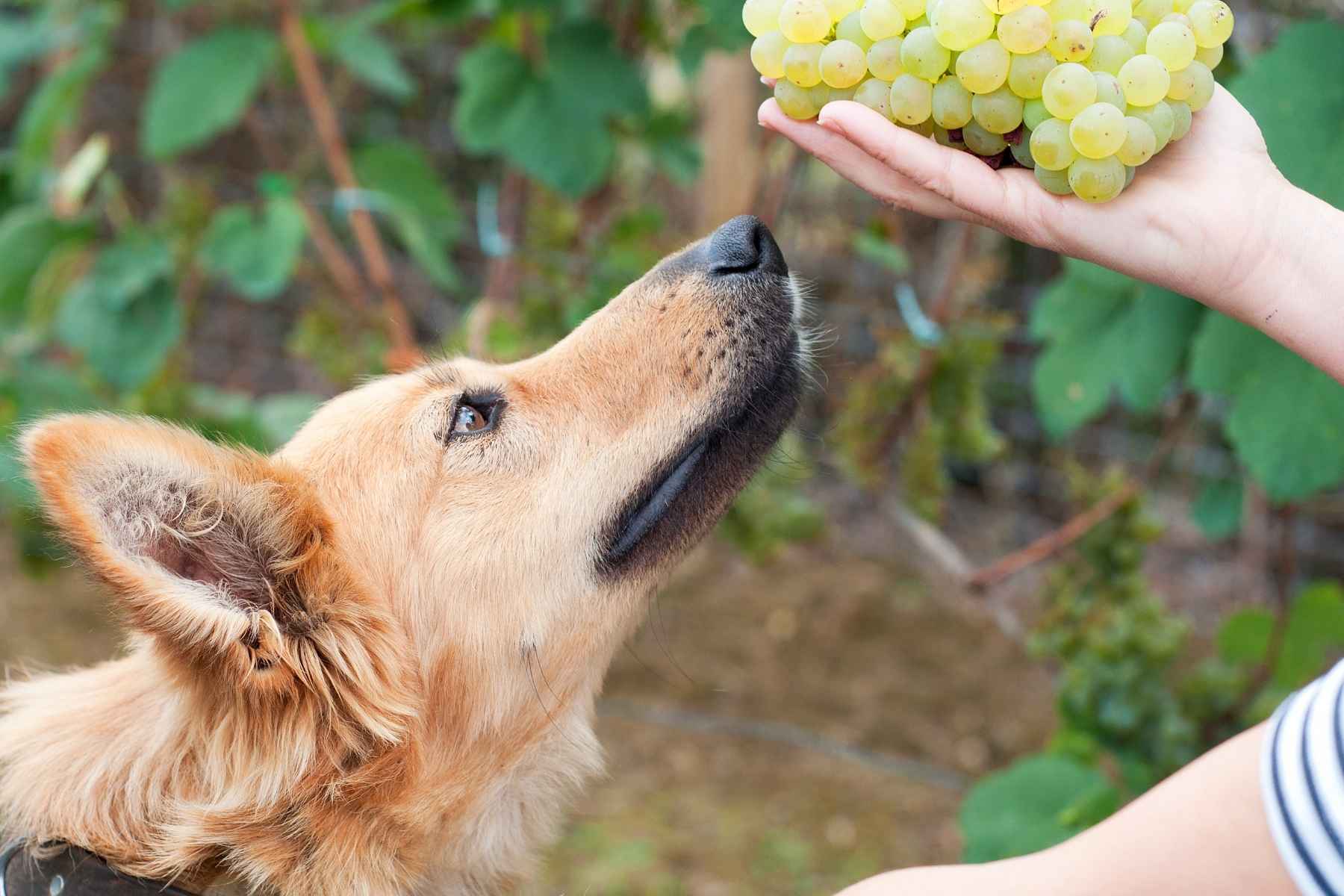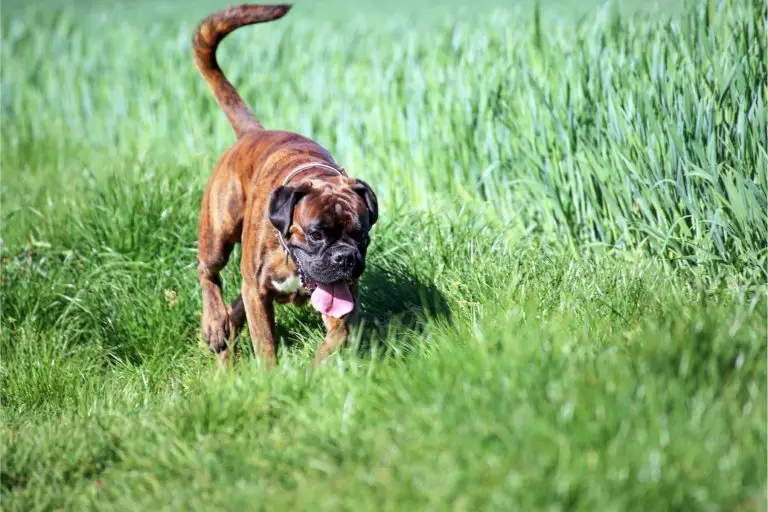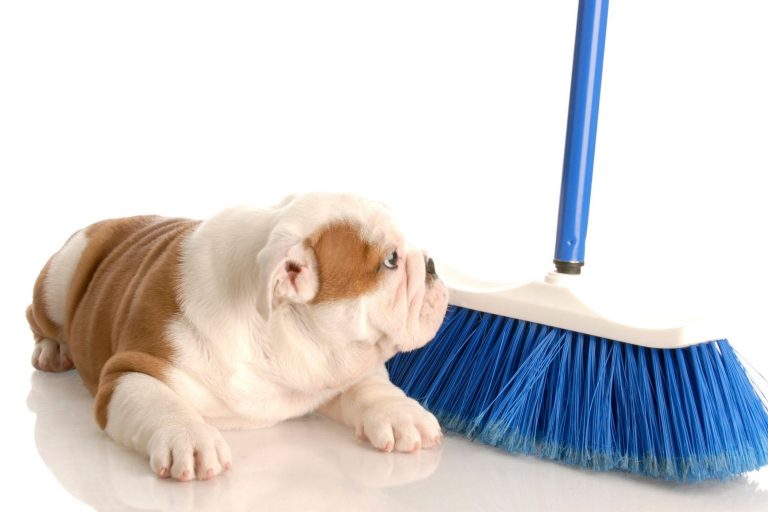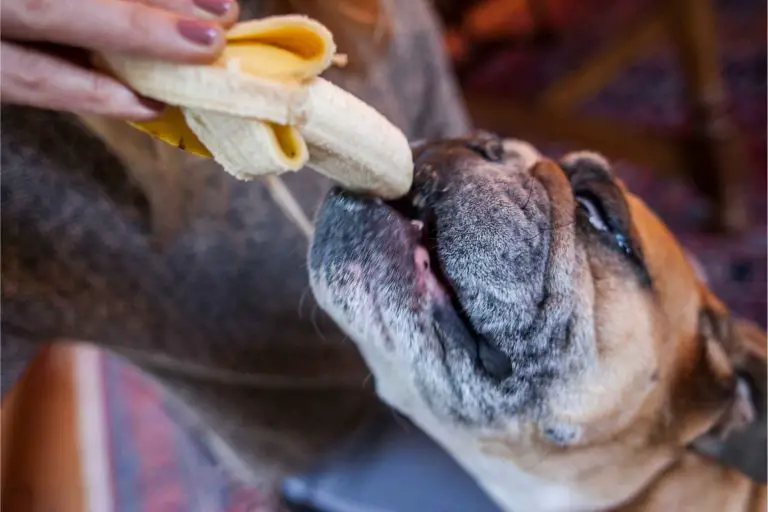Can Dogs Eat Grapes?

Grapes are an excellent fruit for healthy snacking, and they make the perfect tabletop treat to offer to guests. But you may find that once you introduce a dog to the family, the grapes must go.
Dogs should not eat grapes – or grape products such as raisins and currants – because this foodstuff is highly toxic to them. While the exact reasons for this toxicity are unknown, it can be severe, and just one grape is enough to cause serious and lasting harm to your dog.
Keep reading to find out how toxic grapes are to dogs and the steps you’ll need to take if your dog eats one. Gain a number of helpful tips to keep your dog safe and find the best alternative fruits to give them as a treat.
Can Dogs Eat Grapes?
Dogs cannot eat grapes; this fruit is highly toxic and can be fatal for your canine. The exact amount that will cause a deadly reaction depends on your dog’s age, health, and size, among other factors.
All grapes are toxic to dogs, whether red, green, seeded, unseeded, or organic. A grape “flavor” may be okay, such as that in jelly, but you’ll need to check food labels very closely, and it’s better to avoid anything associated with grapes if you want to keep your dog safe.
Can Dogs Eat Raisins?
Raisins are dried grapes and should never be consumed by your dog. Raisins are just as poisonous, if not more so, than the standard grape because their nutrients and ingredients are more concentrated.
Why Are Grapes Toxic To Dogs?
The reason why grapes, raisins, currants, and wine are toxic to dogs is unknown, but scientists and researchers put forward some potential reasons. It could be tartaric acid, a white organic acid, or the presence of a salicylate drug found in grapes that cause health issues in your canine.
Some researchers believe these substances could decrease the amount of blood flow to the kidneys, though the facts are still unproven.
In addition, dogs are unable to metabolize the monosaccharides, tannins, and flavonoids from grapes; this could also be a leading cause of grape toxicity.
How Dangerous Are Grapes For My Dog?
Grapes are highly toxic to dogs; just one is enough to cause serious issues such as acute kidney failure.
Can Grapes Kill Dogs?
Sadly yes, grapes can kill dogs, and there’s no minimum amount that can lead to this fatal consequence. Some dogs would need to ingest a reasonable amount of grapes for significant damage to occur, while others could die from eating a single grape.
Small dogs are particularly at risk, but that doesn’t mean big dogs are safe. If left untreated, your dog could quickly develop kidney issues that ultimately lead to its death.
How Can I Tell If My Dog Has Toxic Poisoning?
There are a range of symptoms that point to the fact that your dog may have toxic poisoning; they usually appear within the first 24 hours after consumption. These include the following:
- Appearing tired, weak, or lethargic; less energy than usual.
- Loss of appetite.
- Symptoms of stomach upset such as vomiting or diarrhea.
- They show signs of dehydration, including panting, pale gums, or a dry nose
- Increased thirst or urination
If you suspect that your dog has ingested a grape or any other toxin, call the pet poison helpline immediately for advice.
How Can I Tell If My Dog Is Dehydrated?
Toxic poisoning can often lead to dehydration. Common signs of dehydration include excessive thirst or urination, panting, pale gums, or having a dry nose and mouth.
If you’re unsure whether or not your dog is dehydrated, try gently pulling the skin at the back of its neck. In a hydrated dog, this skin should spring straight back into place; your canine is likely dehydrated if it doesn’t.
What Should I Do If My Dog Eats A Grape?
If your dog eats a grape, you need to seek treatment immediately. Often, this involves inducing vomiting in your canine. However, you should never attempt to induce vomiting unless instructed by a professional.
Additionally, if your dog is struggling to breathe, shows any signs of distress, or is unconscious, you should not induce vomiting. The more grapes your dog eats, the more at risk they are of kidney failure, which is an essential factor in their treatment.
Multiple ailments can present similarly to grape toxicity, so don’t induce vomiting unless you’re absolutely sure that your dog ate a grape. Otherwise, you could exacerbate another health condition.
What Will My Vet Do To Treat Grape Toxicity?
If your dog requires treatment for grape toxicity, then induced vomiting is likely to be the first step that your vet will take. Additionally, they may use activated charcoal to prevent further absorption of the toxins into the stomach or intestines.
The number one priority for your vet will be to prevent the development of kidney problems in your dog, and this may involve them using intravenous fluids.
When you first call the vet, they’ll likely give you instructions to follow over the phone. This may include mixing a hydrogen peroxide solution to induce vomiting. The most crucial factor is to follow your vet’s or specialist’s advice and not try to treat your dog with home remedies.
Will My Dog Recover From Grape Toxicity?
If your pet ingests poison, it can be terrifying for you as an owner, and you’re not sure what will happen next. It depends on the number of grapes they ate, their size and weight, etc.
Sometimes a dog can eat a grape or two and experience no adverse side effects at all; other times, the impact of this fruit happens quickly. The most critical element is to call for help immediately.
The faster you act, the less chance your dog will suffer long-term damage. If your vet can prevent this toxic substance from being absorbed, your pup can make a full recovery.
Most long-term problems occur if the kidneys are damaged. As they can’t repair themselves, it can lead to long-term health implications and sometimes death.
How Can I Prevent My Dog From Eating Grapes?
You try your hardest to prevent your dog from eating certain foods, but the minute you turn your back, they sneak a nibble. For many food types, this is not a big deal; in a worst-case scenario, your pet might experience a mild tummy upset.
However, when it comes to grapes, even one can be fatal, so you must ensure that your dog does not have access to this toxic fruit.
The safest solution, of course, is not to purchase grapes or keep them in your house. This way, you can ensure that your dog will not ingest one when you turn your back. But, if you can’t resist the juicy taste of a bunch of grapes, there are other things you can do to minimize the risk.
Keep your grapes in a bag or container, and ensure they are always out of reach of your canine. Never leave grapes out on the side or unattended.
In addition, check the ingredients of any human foods before feeding them to your pets. You’ll be surprised at the unexpected items added to some of our everyday favorites.
And if you have small children in the house, avoid giving them grapes when your pet is around. Your child could easily drop the grape or give your dog a taste, thinking that they are being kind. Plus, it’s easy for dogs to take a grape from a child, whereas it’s much harder for them to prise it from an adult hand.
Can Dogs Eat Any Fruits?
Yes, there are plenty of fruits that dogs can eat, such as bananas, strawberries, and watermelon. These are all excellent sources of vitamins and antioxidants and don’t possess any toxins.
As a general rule, remove any rind, skin, seeds, or stalks from the fruit before feeding it to your dog and cut it into manageable chunks for them.
Remember that treats should only account for 10% of your dog’s overall diet. The best nutrition for your canine comes from the balanced ingredients of dog food, products made specifically for their consumption rather than human consumption.
Any food can cause a reaction in your pet, so if you try anything new, always give them a small amount to start with and monitor for any symptoms of tummy upset. And, if you are thinking about changing your dog’s diet, consult with your vet for the best advice.
Final Thoughts
You should never give your dog a grape to treat them; ingesting this fruit can be toxic, even in tiny amounts. Instead, you need to keep grapes far from the reach of your canine and use more appropriate foods as a treat.
If your dog does consume a grape, you need to act quickly and seek out professional help immediately. The faster you act, the higher chance that your dog can make a full recovery.






